Learn how to make ramen eggs the simple way with this quick and easy Japanese ajitama recipe. Enjoy perfectly set whites and soft, runny yolks – ideal for serving with ramen or as a delicious snack!
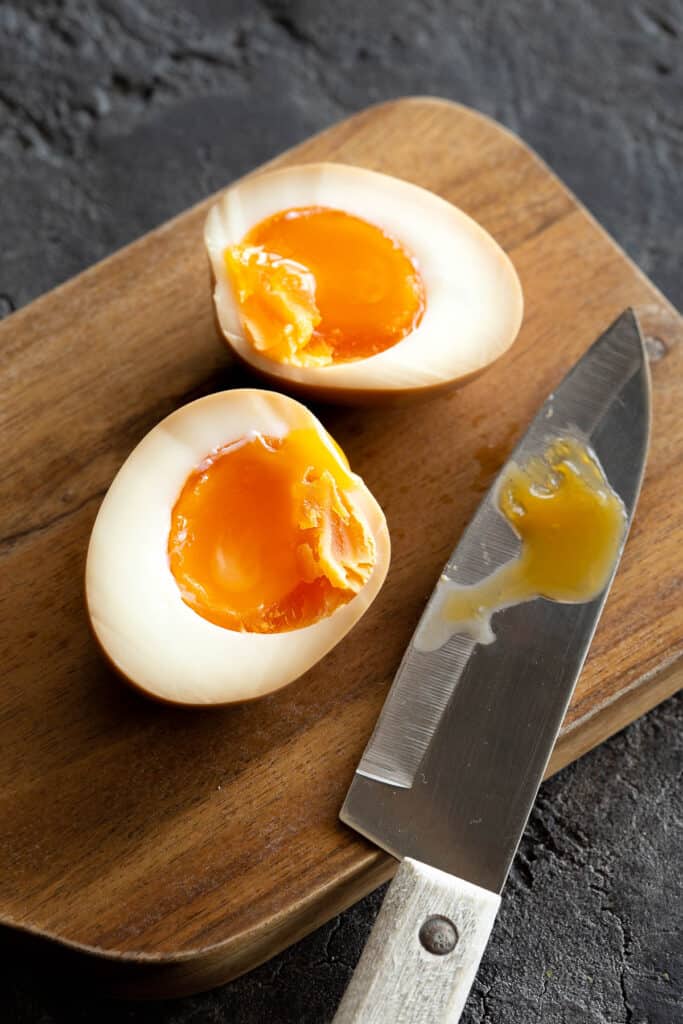
In This Post You’ll Learn
Why We Love This
These soft and jammy ajitama eggs are super delicious and so easy to make – the perfect accompaniment to homemade ramen or tantanmen.
While they’re known as ramen eggs, they’re also amazing with other dishes too. Keep reading for more great ideas.
Related: Tantanmen Ramen / Rabokki / Onsen Tamago
Ajitama Marinade – Should it Be Cooked?
You don’t have to cook the marinade. You can simply mix the ingredients together, add the boiled and peeled eggs, and set them aside to marinate (as we have in our video).
However, you might want to cook the marinade to remove the alcohol content from the cooking sake and the mirin. This might be for dietary reasons, or to make them safe for kids to eat.
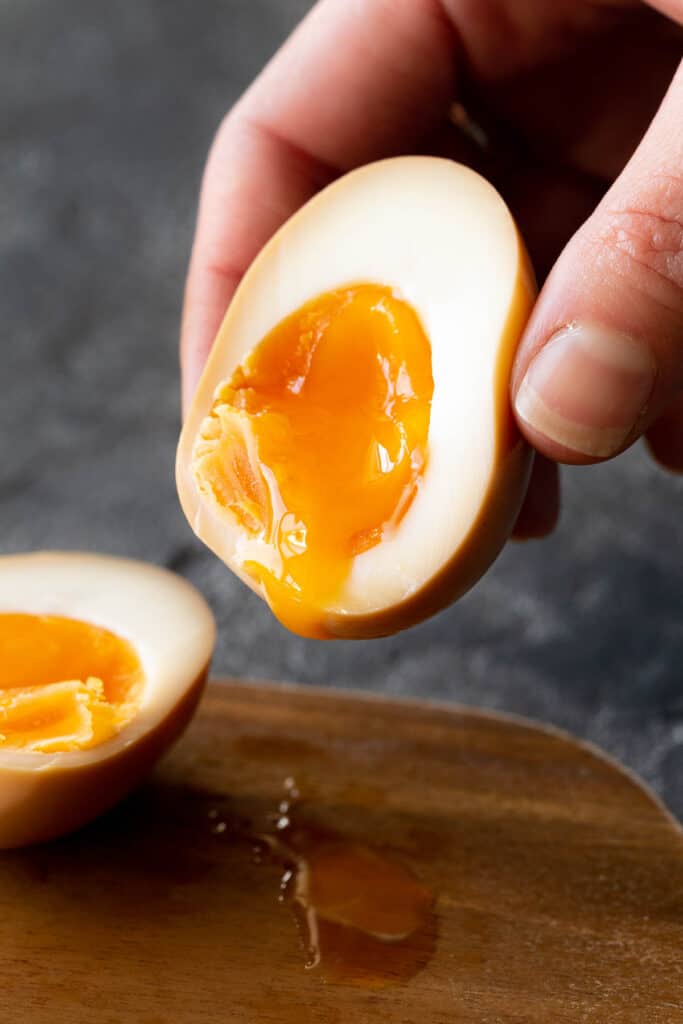
What is Ajitama?
Ajitama is a shortened name for ajitsuke tamago / 味付け玉子, which translates as “seasoned egg” or “soy sauce marinated egg”.
The eggs are soft boiled until just the whites are set, while the yolks are runny or just starting to firm up into a soft and jammy texture.
They’re then cooled in ice water, then peeled and marinated in a mix of classic Japanese seasonings including soy sauce, mirin and sake. Sometimes a splash of dashi stock is added for extra umami flavour, which is how we’re making them today!
What You’ll Need
- Eggs – Use eggs straight from the fridge for this recipe. We use extra large eggs that weigh around 59 g / 2 oz. If your eggs are smaller or larger you may need to adjust your cooking times.
- Soy Sauce – For the best flavour and quality, use a Japanese soy sauce such as Kikkoman which has the perfect balance of flavour and salt. Chinese or Korean soy sauces may be too salty or bitter for this recipe, however Japanese tamari works great as a gluten-free option. If you only have dark soy sauce on hand you can still use it, you just may need to balance out the intensity with a little extra sugar.
- Cooking Sake – This is a type of rice wine made for cooking. It’s lighter and more delicate in flavour than Chinese cooking wine, but you can use either in this recipe. Look for it at Asian grocers or online.
- Mirin – This is a sweet rice wine for cooking. You can sometimes find it in regular supermarkets, otherwise head to your nearest Asian grocer or online. If you don’t have it, just leave it out and add in 1 tsp of sugar instead.
- Dashi – Use homemade dashi stock or dashi powder dissolved in hot water to flavour the marinade. It’s available in two main varieties – hon dashi (a more intense flavoured stock made with seaweed and bonito flakes) or kombu dashi (seaweed only stock), perfect for vegetarians.
Note: Some versions include sugar for extra sweetness, however we prefer a more savoury flavour and so skipped the sugar in favour of dashi. You can add sugar if you like. Start with 1-2 tsp for an extra hint of sweetness all the way up to 1-2 tbsp.
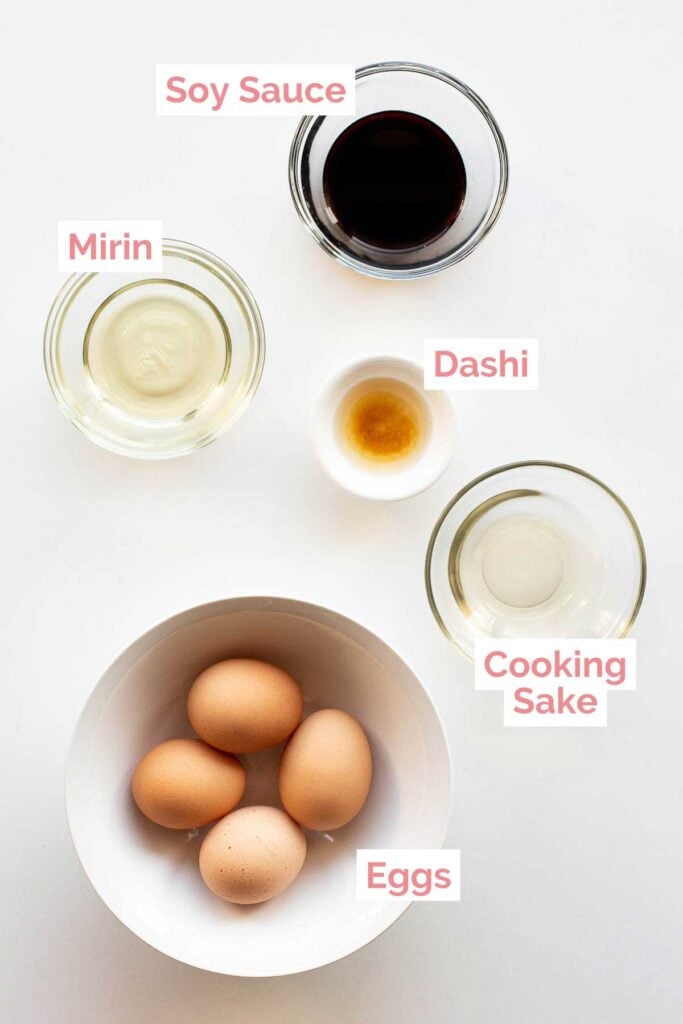
How to Make Eggs for Ramen
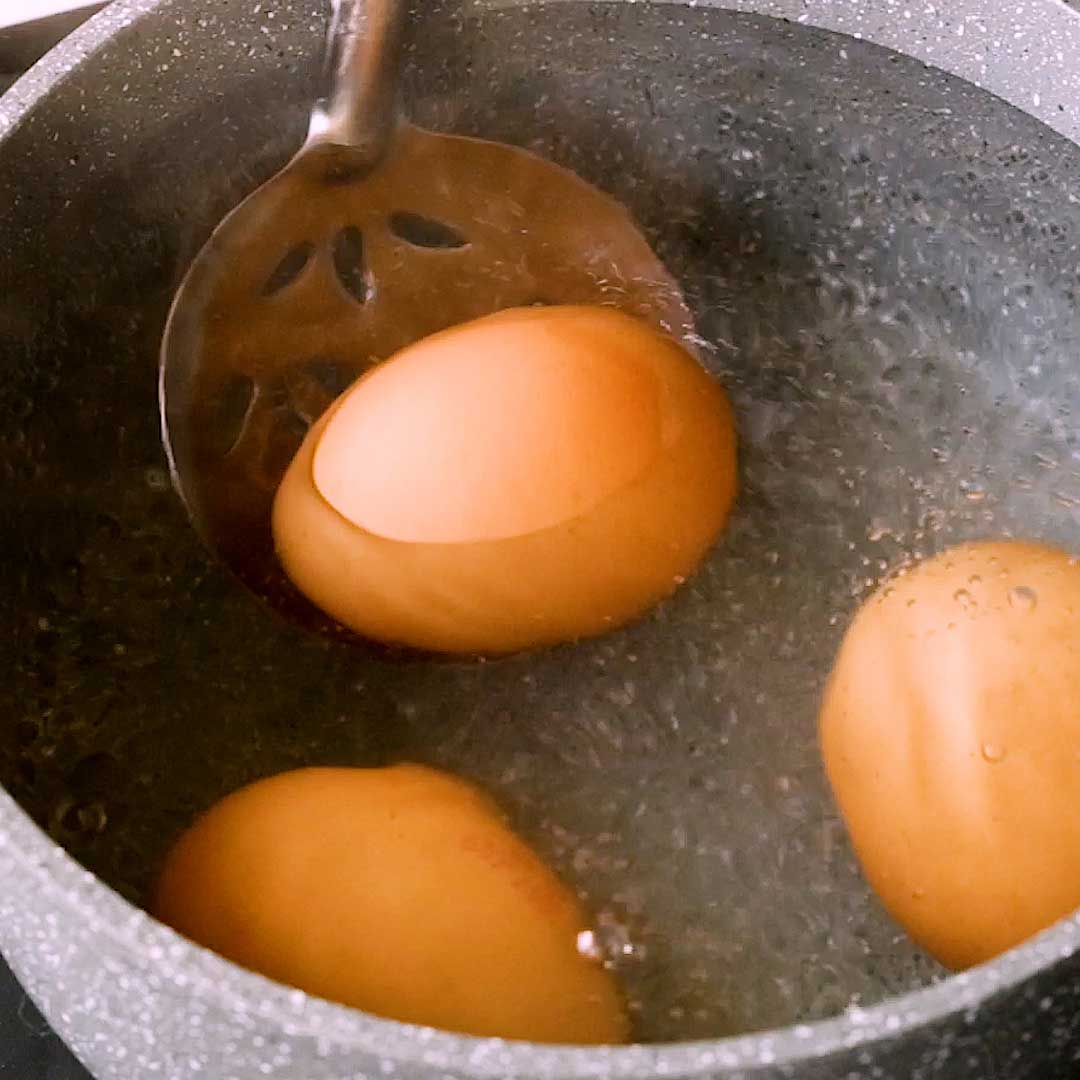
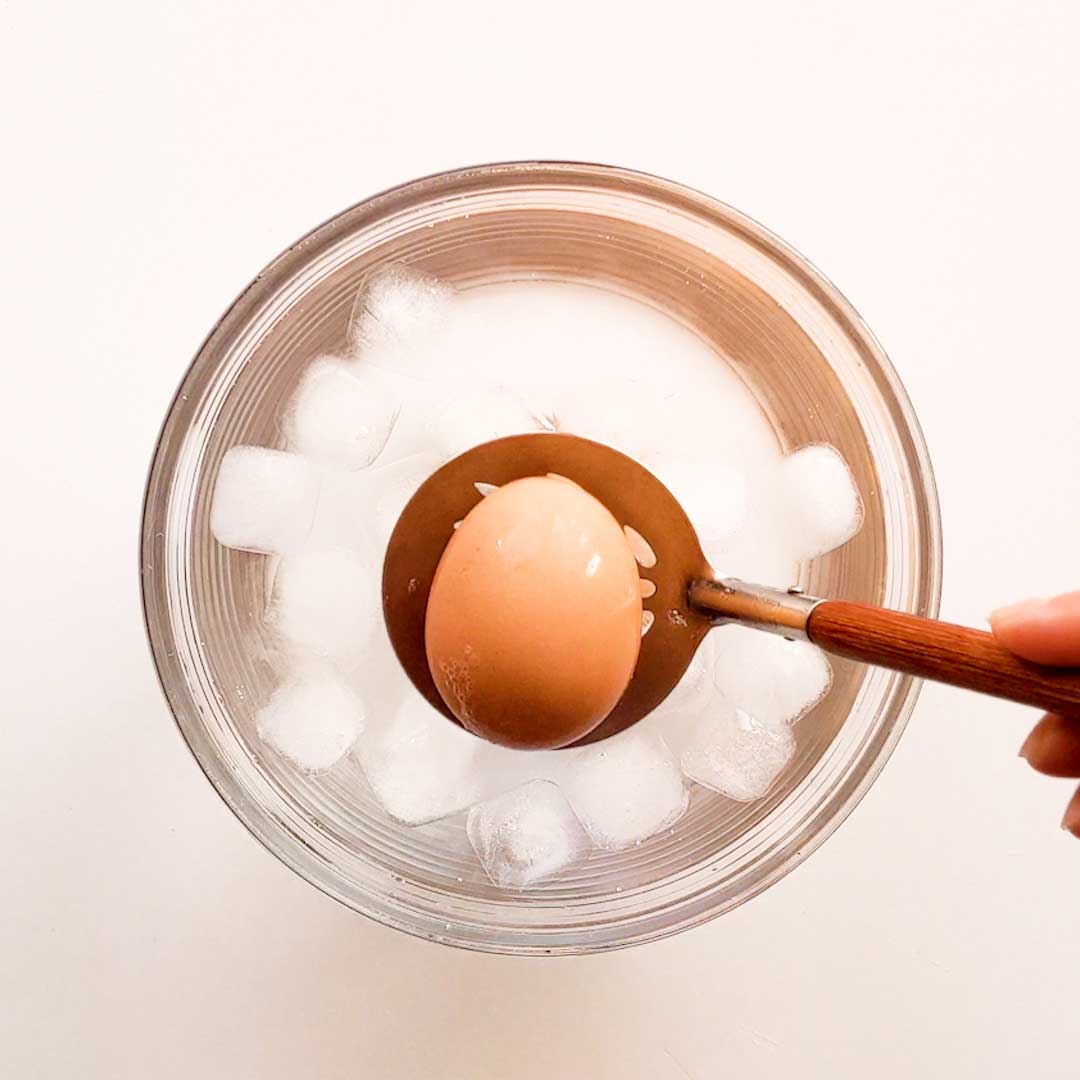
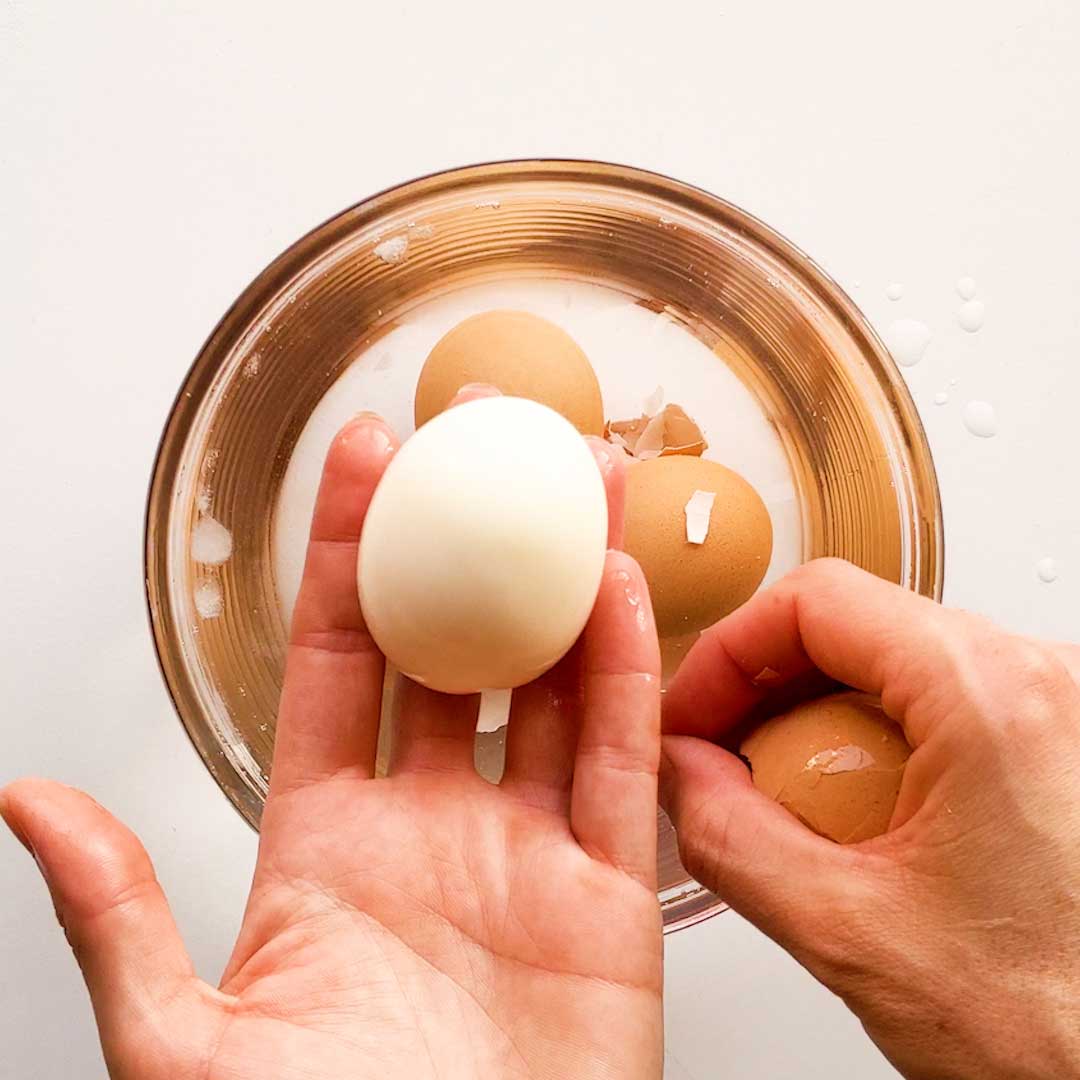
First, gather your ingredients: See recipe card below for measurements.
- Boil water in a small saucepan on medium to high heat (enough to cover 4 eggs). Carefully lower the eggs into the water using a slotted spoon or sieve and boil for 7 minutes.
- Remove from the heat and place the eggs in a bowl of ice water to stop them overcooking, for at least a few minutes.
- No Cook Marinade: While cooking the eggs, add the soy sauce, mirin, cooking sake and dashi to a small dish and mix.
Cooked Marinade: If cooking off the alcohol, heat in a small saucepan until the dashi powder dissolves and alcohol boils off (around a minute or two). Allow to cool before continuing with the recipe. - Remove the shells from the eggs and place them in a jar.
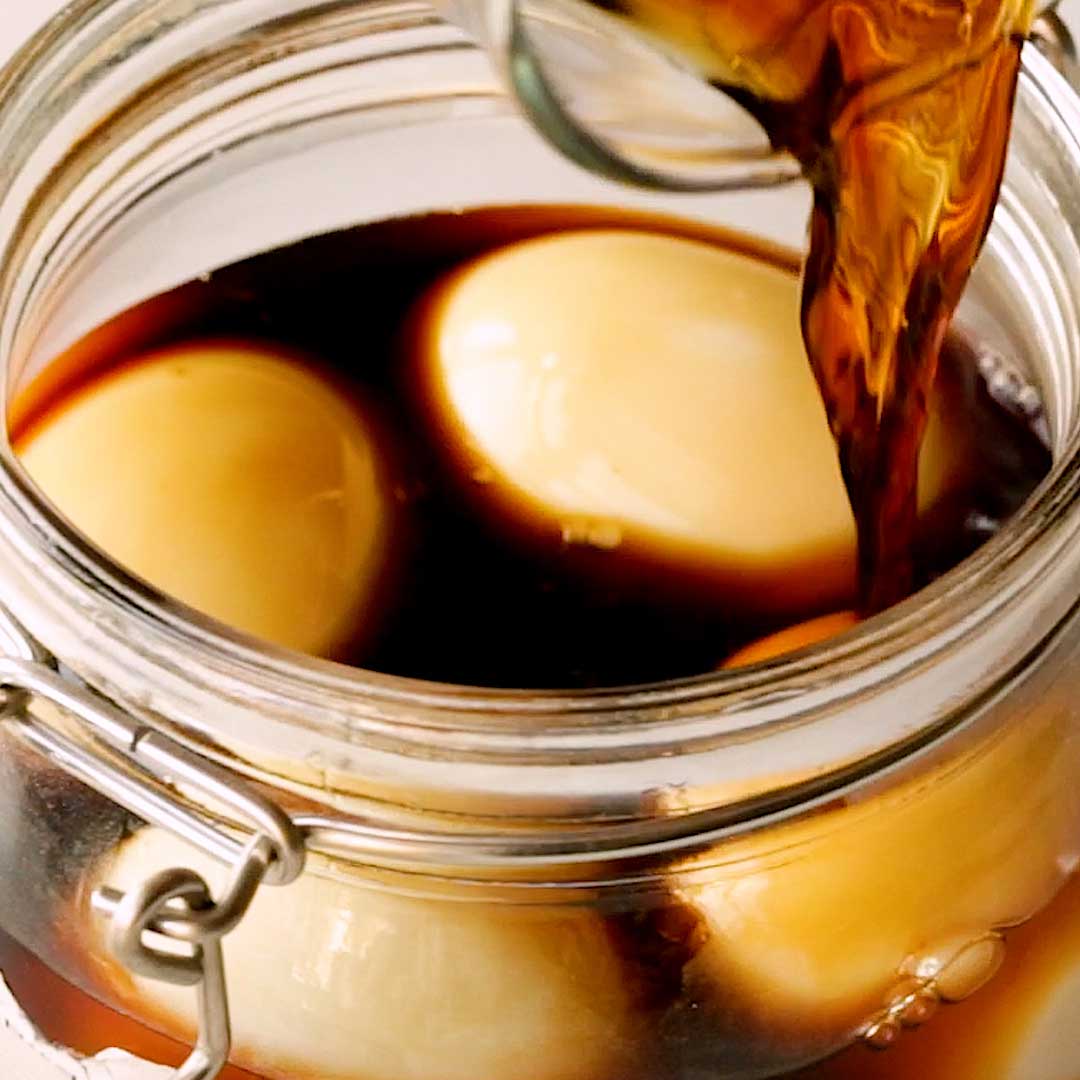
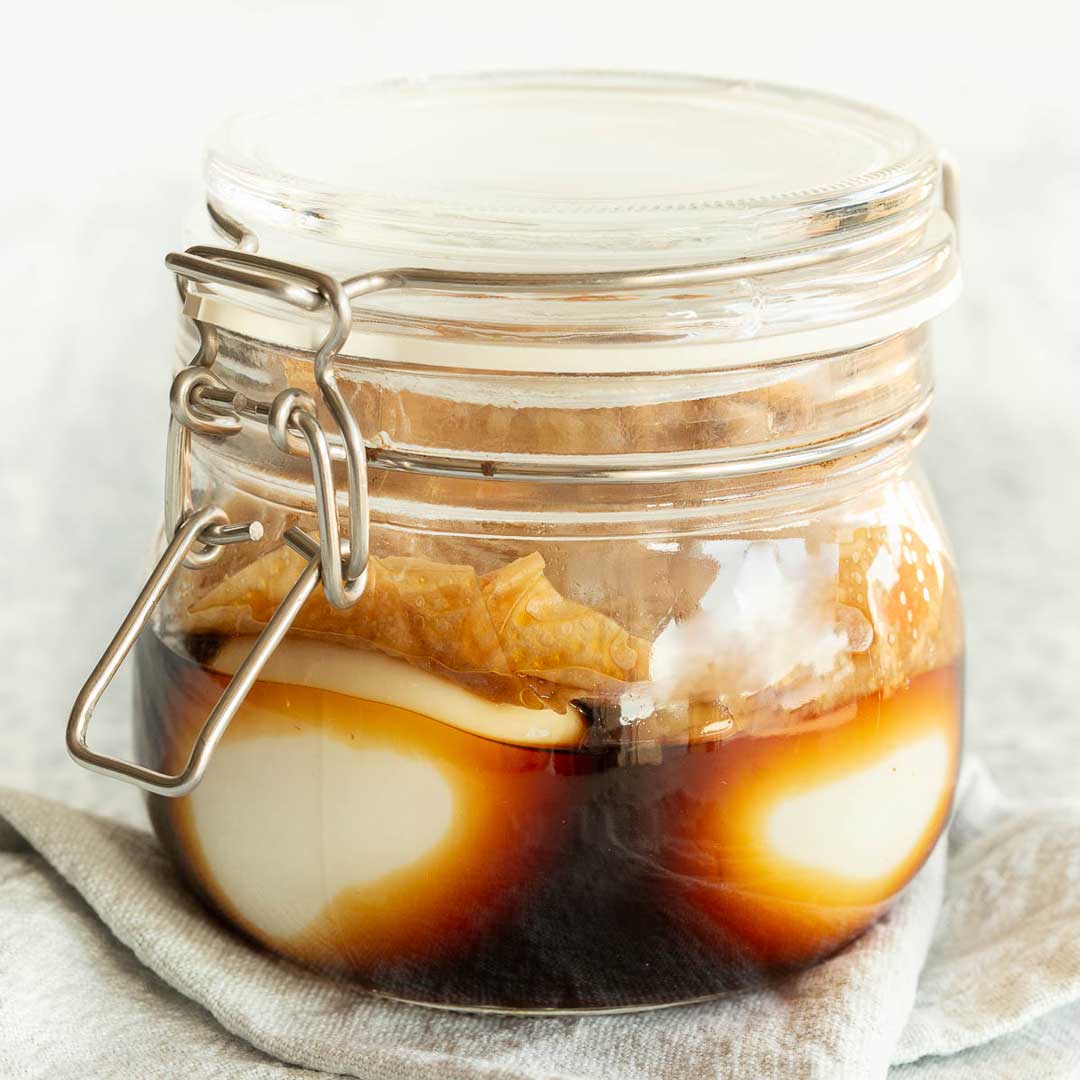
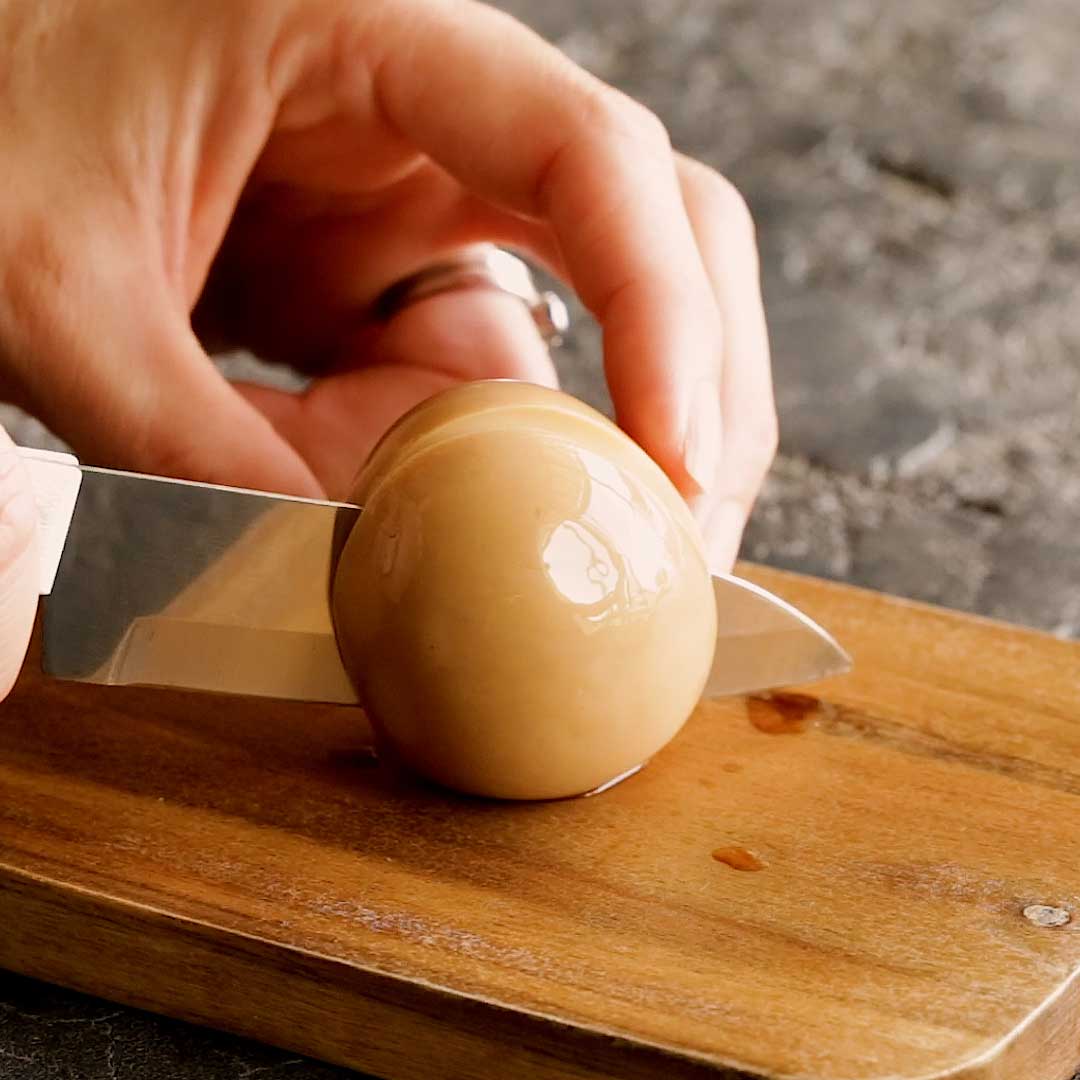
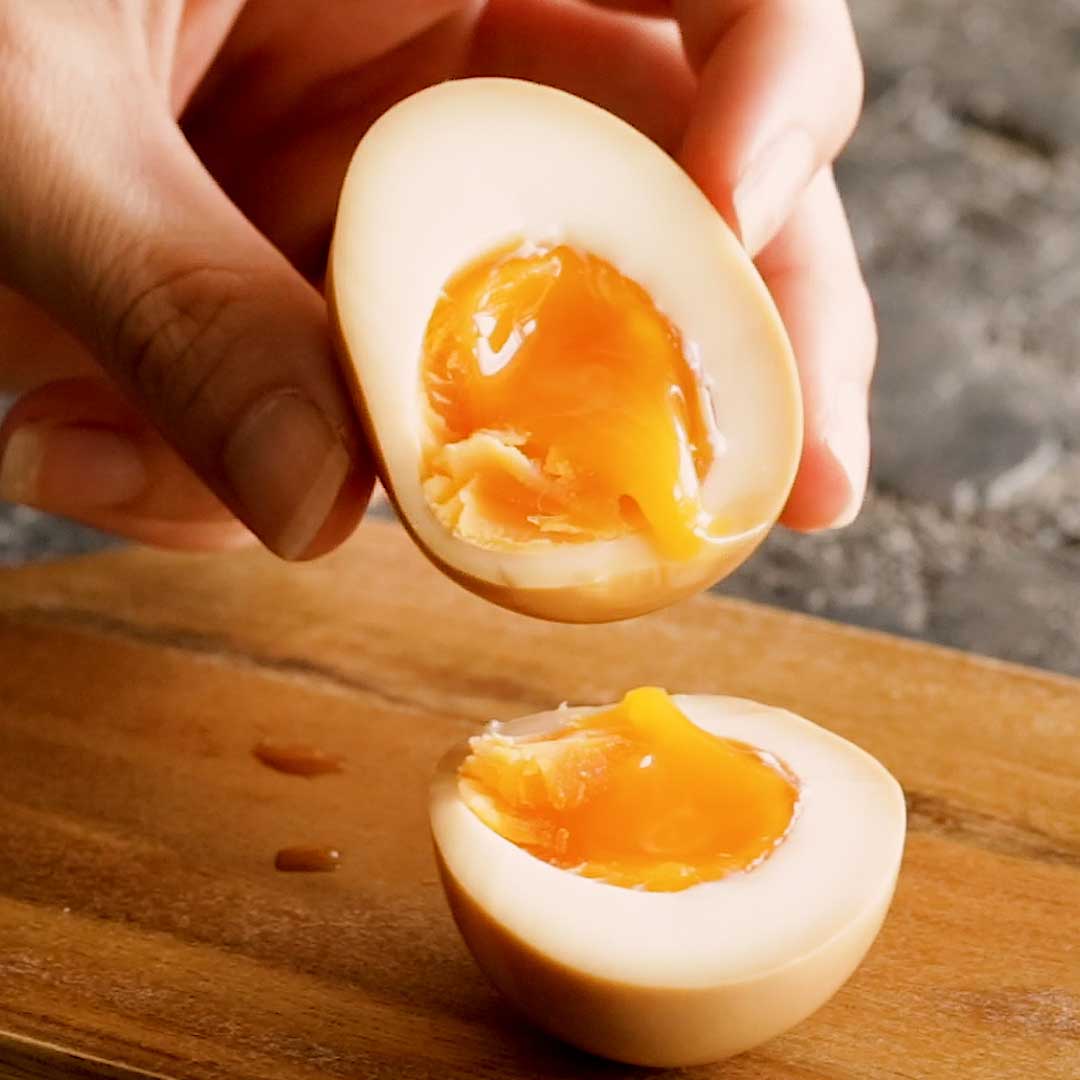
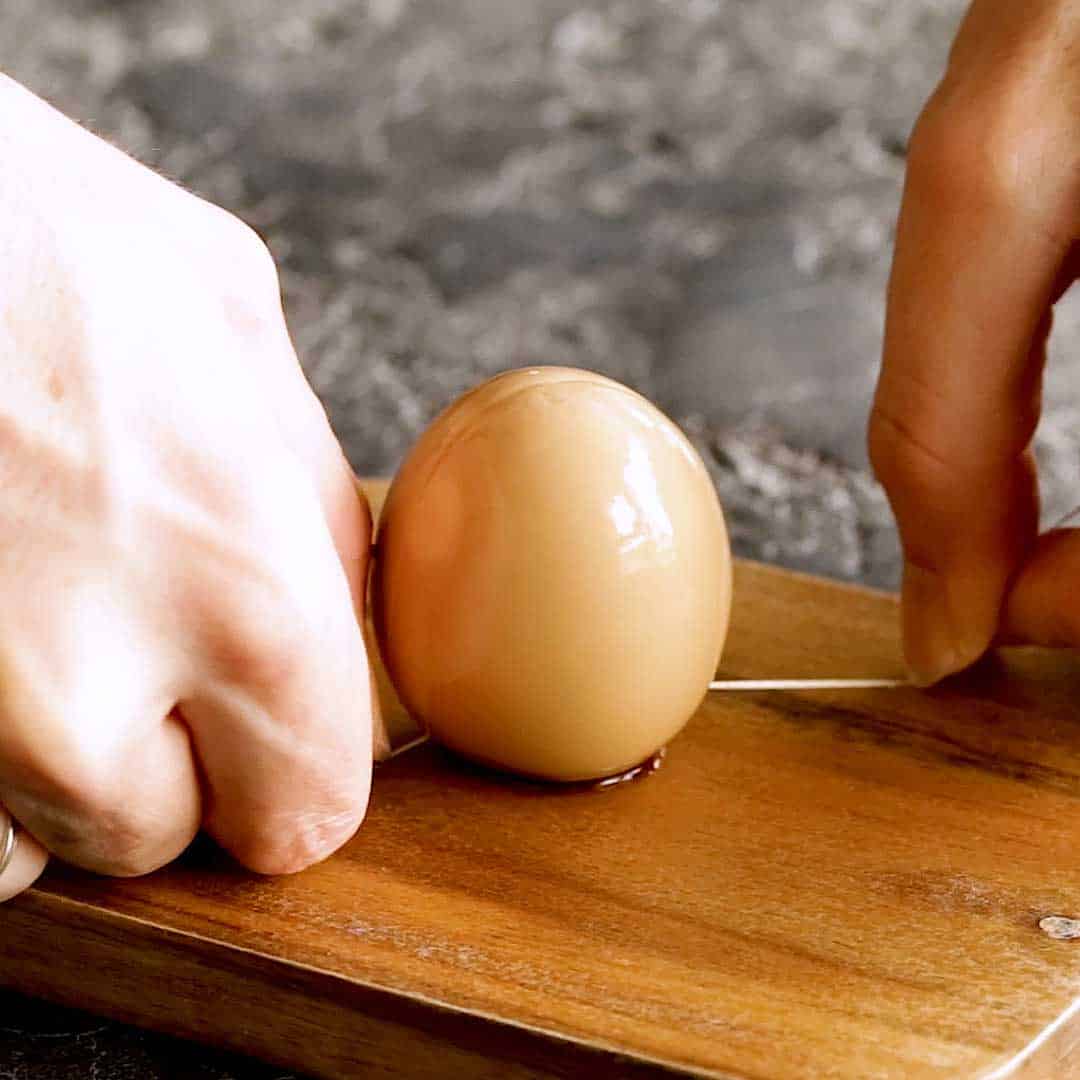
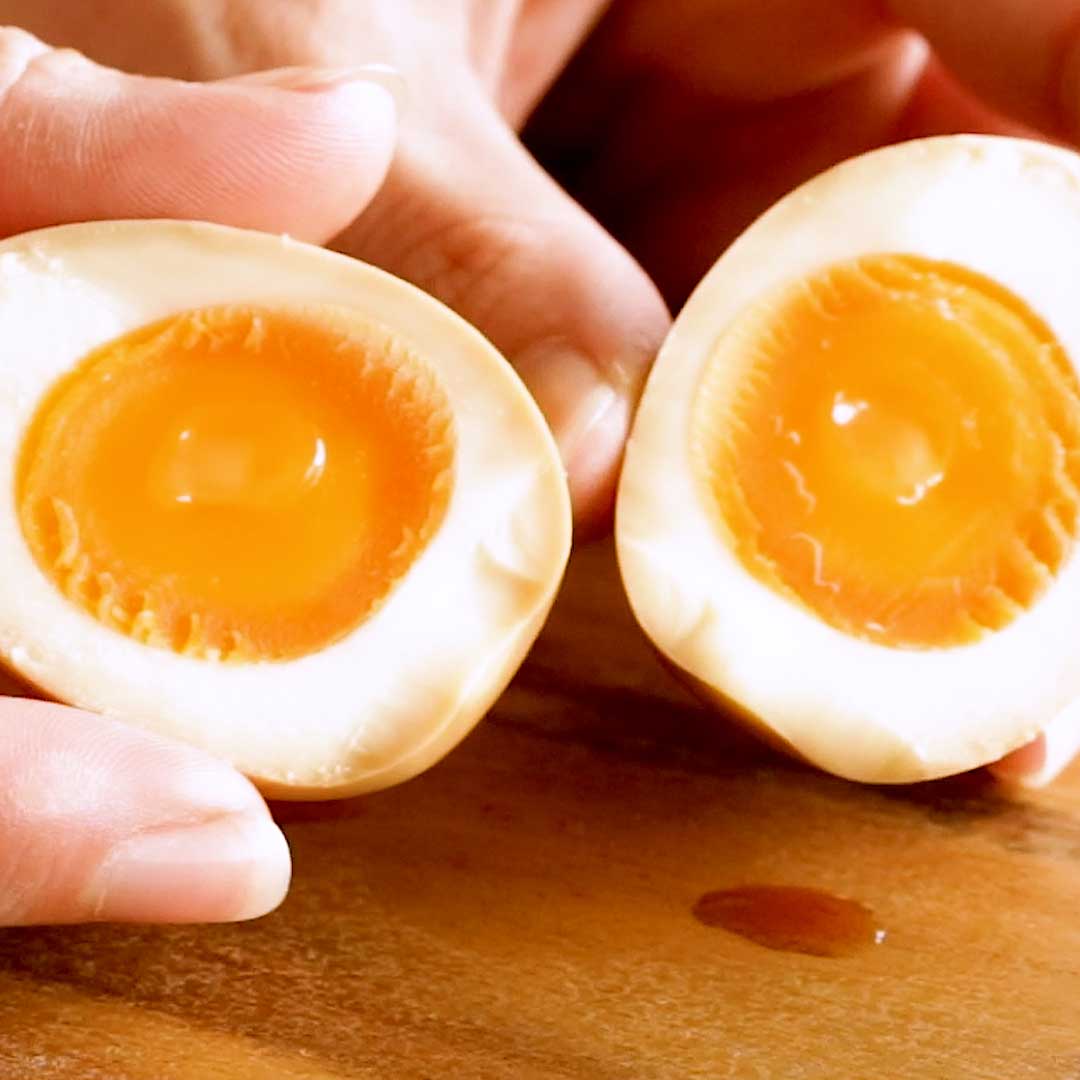
- Pour the soy liquid over the eggs until they’re all covered. Top up with water if necessary.
- Place a clean paper towel over the top and gently press until it absorbs the liquid and covers the eggs entirely to help marinate evenly. Place in the fridge for a minimum of one hour, or overnight, to marinate.
Tip: For even colouring from the soy sauce, rotate the eggs once or twice while marinating.
Marinating Time Options
- 1 hour – light colour and flavour
- 2-4 hours – medium strength flavour and colour
- 6+ hours to overnight – nice and dark with most flavour
- Slicing the eggs – Quickest Way: With a knife. Prettiest Way: Cut with a tight string from the top down – you can use unflavoured dental floss for the best results.
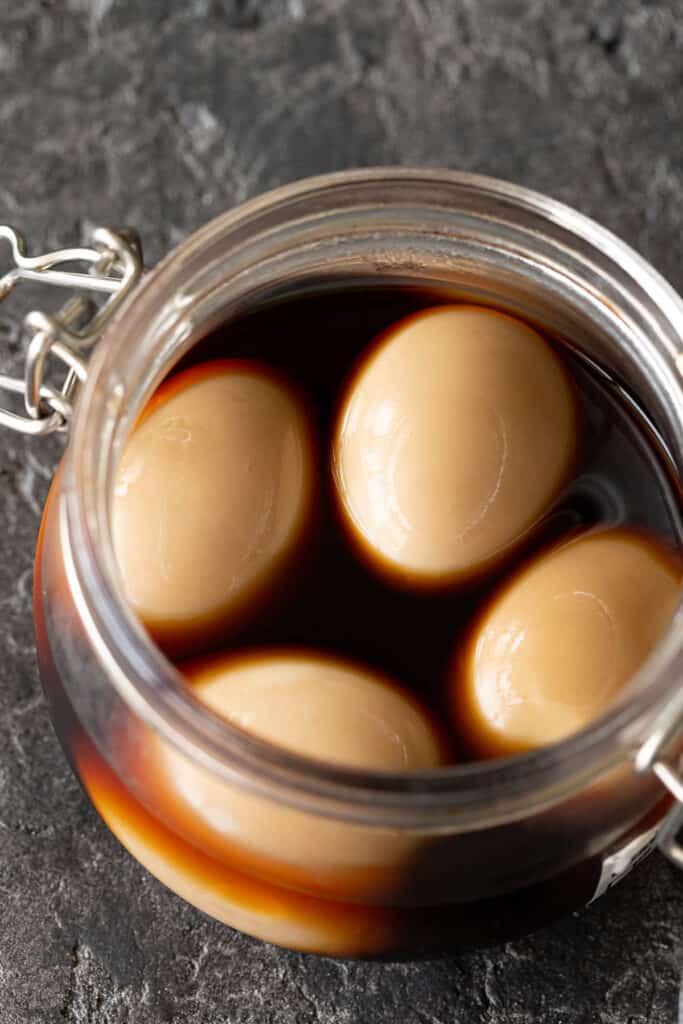
Wandercook’s Tips
- Go Slowly – Don’t just drop the eggs straight into the boiling water, otherwise you risk cracking the shells. Lower them gently into the water using a slotted spoon or sieve.
- Texture – If you know you love runny yolks, take the eggs out of the water at the 6 minute mark. If you prefer them a little more set but still deliciously soft, take them out at the 7 minute mark.
- Ice Bath – Allow the eggs plenty of time to cool down in the ice bath before you transfer them to the marinade. This will keep them at that ideal softness without overcooking from the residual heat.
- Colour – If you’re aiming for the perfect uniform brown colour on the surface, it’s a good idea to give them a little extra space in your container so they don’t press too firmly against the edges or each other. You can also stir them occasionally to make sure the marinade gets all the way around each egg. But don’t stress about it either, they’ll still be delicious either way!
- Storage – Store in the fridge in an airtight container for 3 days max. Note that the longer you leave them, the more likely the marinade will penetrate through the layers of the egg and start to cure / firm up the yolks.
FAQs
You might have been a little too hasty when dropping the eggs into the water. Lower them slowly and carefully into the water and don’t let them fall on the bottom of the pan.
If your eggs are still cracking, you can try adding a tsp of salt or vinegar to the water. They might still crack, but it should stop the egg whites leaking out into the water.
It depends! If you prefer a lighter flavour with minimal colour, you can marinate them for around 1-2 hours. If you like a stronger flavour and deeper colour, marinate them overnight.
Ramen eggs are delicious on their own as a light yet filling snack. You can even serve them cold as part of a homemade bento box. We recommend sprinkling with furikake rice seasoning or gomashio sesame salt to garnish. If you like them spicy, serve with a drop or two of rayu chilli oil.
We love adding them to soups and stews like Korean army stew, tteokbokki or rabokki. You can let them heat up in the soup for the last 5 minutes of cooking, or pop them in cold. Your choice!
This marinade uses similar ingredients as our yakitori sauce, mentsuyu sauce or homemade teriyaki sauce, just different ratios of ingredients. If you love making Japanese sauces at home and already have some on hand, feel free to use them!
Variations
- Add Miso – For an extra umami twist on the flavour, dissolve 1 tsp of red or white miso in hot water and stir into the marinade mixture.
- Firm Yolks – If you don’t like the traditional soft boiled yolks, you can boil the eggs for around 10-12 minutes to make them hard boiled, then marinate as per the recipe.
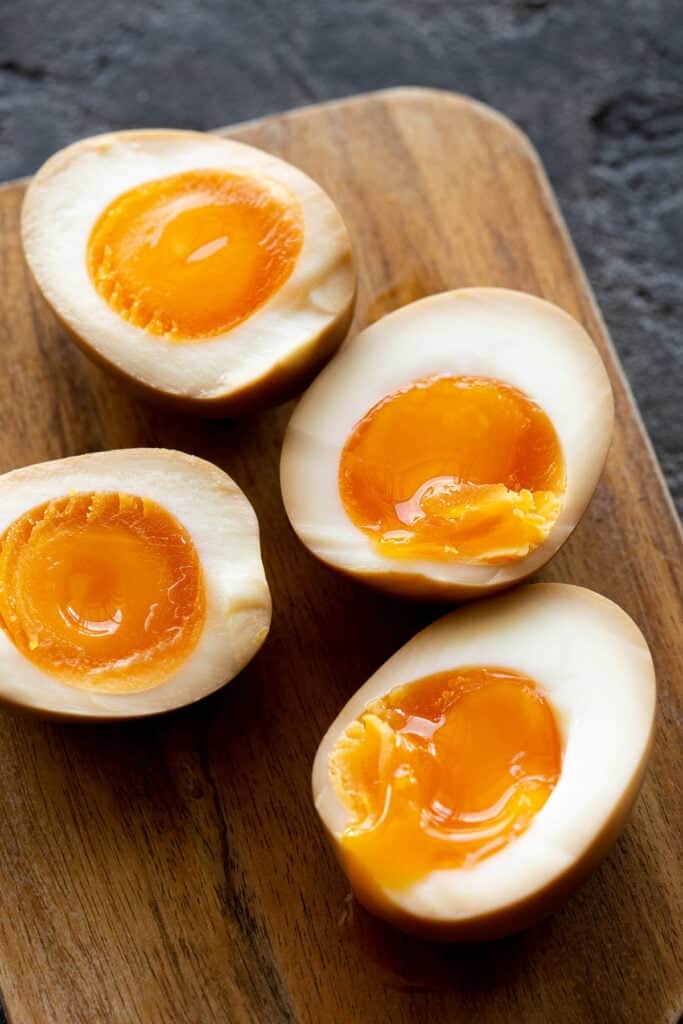
Try these amazing recipes next:
★ Did you make this recipe? Please leave a comment and a star rating below!
Ingredients
- 4 eggs extra large 59 g / 2 oz, cold from fridge – important!
- ¼ cup soy sauce
- ¼ cup mirin
- ¼ cup cooking sake
- ½ tsp dashi powder dissolved in 1 tbsp hot water
- water for boiling, then if required, to top up and cover eggs in jar
- iced water for cooling eggs down, cold water is also okay.
Instructions
- Boil water in a small saucepan on medium to high heat (enough to cover 4 eggs). Carefully lower the eggs into the water using a slotted spoon or sieve and boil for 7 minutes. Remove from the heat and place the eggs in a bowl of iced water to stop them overcooking.4 eggs, water, iced water
- No Cook Marinade: While cooking the eggs, add the soy sauce, mirin, cooking sake and dashi to a small dish and mix. Cooked Marinade: If cooking off the alcohol, heat in a small saucepan until the dashi powder dissolves and alcohol boils off (around a minute or two). Allow to cool before continuing with the recipe.¼ cup soy sauce, ¼ cup mirin, ¼ cup cooking sake, ½ tsp dashi powder
- Remove the shells from the eggs and place them in a jar. Pour the soy liquid over the eggs until they're all covered. Top up with water if necessary. Place a clean paper towel over the top and gently press until it absorbs the liquid and covers the eggs entirely to help marinate evenly. Place in the fridge for a minimum of one hour, or overnight, to marinate.Tip: For even colouring from the soy sauce, rotate the eggs once or twice while marinating.water
Marinating time options
- 1 hour – light colour and flavour
- 2-4 hours – medium strength flavour and colour
- 6+ hours to overnight – nice and dark with most flavour
Slicing the eggs
- Quickest Way: With a knife. Prettiest Way: Cut with a tight string from the top down – you can use unflavoured dental floss for the best results
Video
Recipe Notes
- Go Slowly – Don’t just drop the eggs straight into the boiling water, otherwise you risk cracking the shells. Lower them gently into the water using a slotted spoon or sieve.
- Texture – If you know you love runny yolks, take the eggs out of the water at the 6 minute mark. If you prefer them a little more set but still deliciously soft, take them out at the 7 minute mark.
- Ice Bath – Allow the eggs plenty of time to cool down in the ice bath before you transfer them to the marinade. This will keep them at that ideal softness without overcooking from the residual heat.
- Colour – If you’re aiming for the perfect uniform brown colour on the surface, it’s a good idea to give them a little extra space in your container so they don’t press too firmly against the edges or each other. You can also stir them occasionally to make sure the marinade gets all the way around each egg. But don’t stress about it either, they’ll still be delicious either way!
- Storage – Store in the fridge in an airtight container for 3 days max. Note that the longer you leave them, the more likely the marinade will penetrate through the layers of the egg and start to cure / firm up the yolks.
- Add Miso – For an extra umami twist on the flavour, dissolve 1 tsp of red or white miso in hot water and stir into the marinade mixture.
- Firm Yolks – If you don’t like the traditional soft boiled yolks, you can boil the eggs for around 10-12 minutes to make them hard boiled, then marinate as per the recipe.
Nutrition
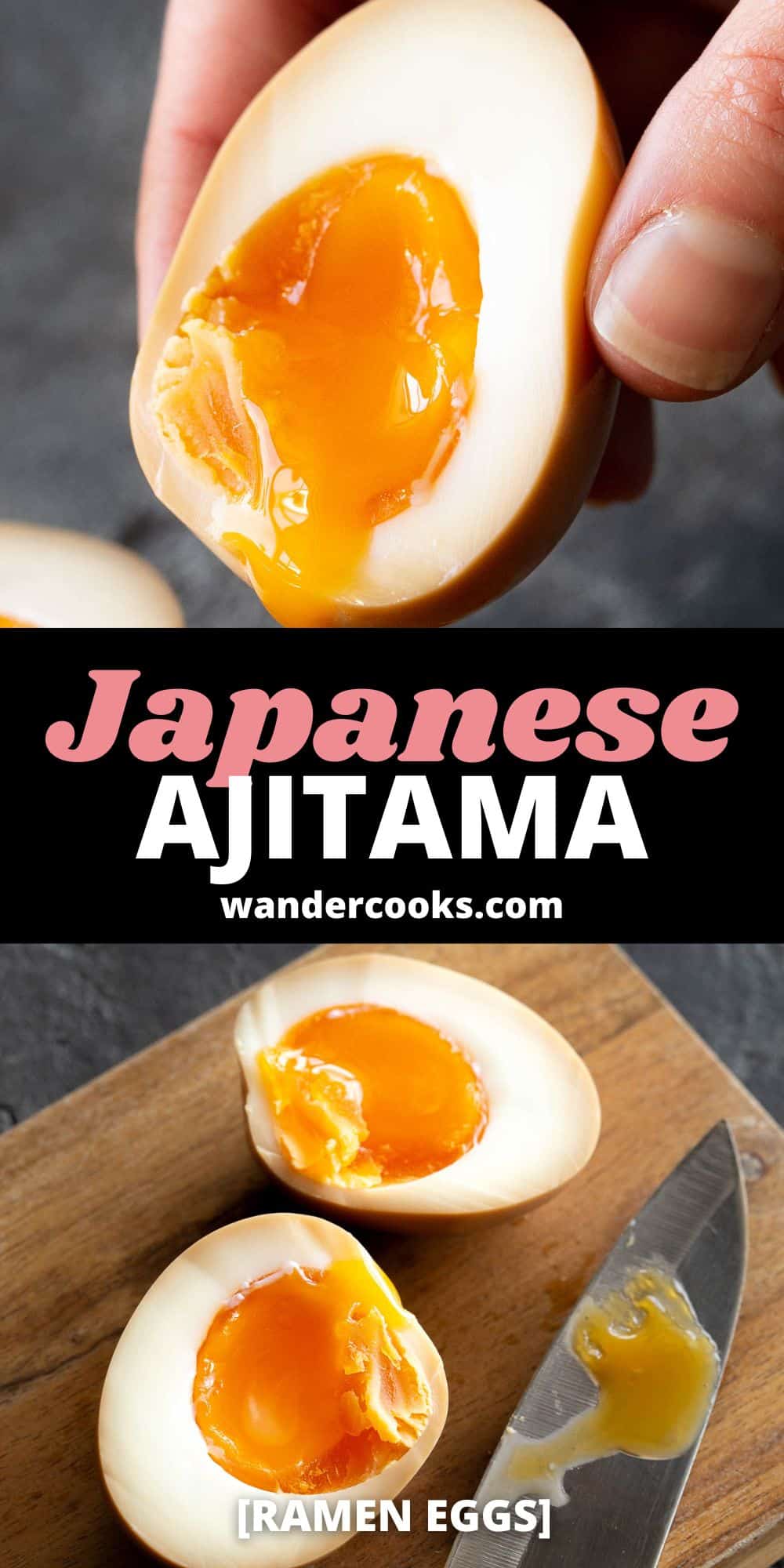

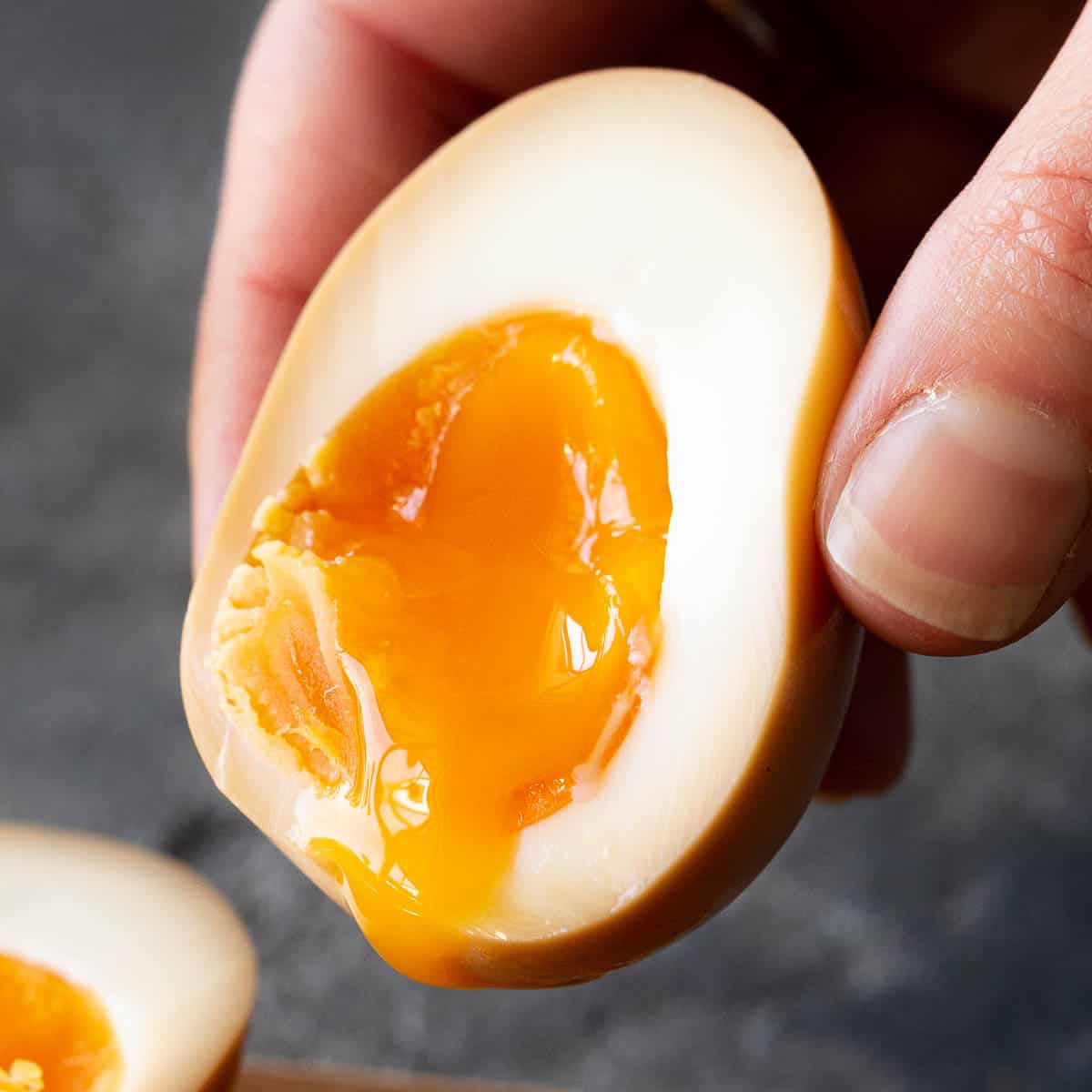



No Comments